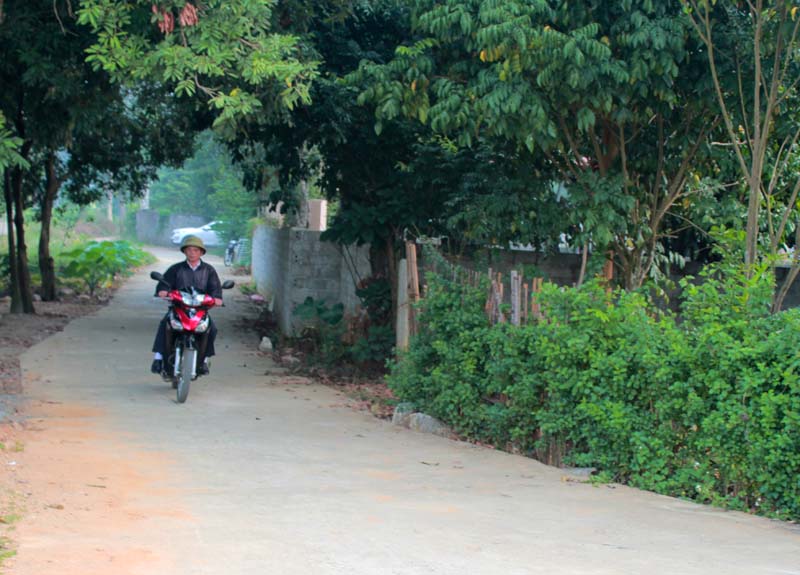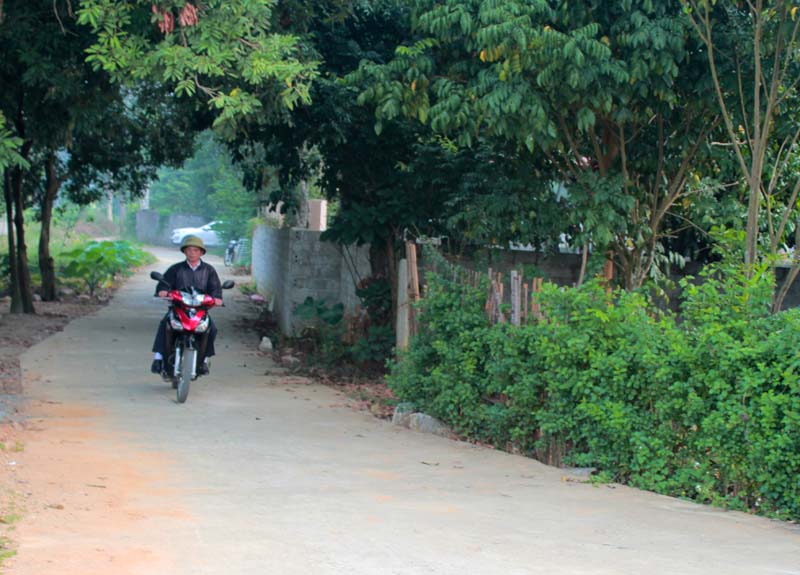
HBO – After eight years of implementing the national target programme on building new-style rural areas, with joint efforts of the local Party Committee, government people, the rural face of Ky Son district has changed dramatically.
Particularly,
the district has focused on optimising resources to develop the rural transport
system, considering it a premise for building new-style rural areas. By the end
of 2018, the district had five out of eight communes recognised as new-style
rural area.

The rural transport system in Dan Ha
commune (Ky Son district) has been upgraded to meet the travel and trading
demand of locals.
Defining that
developing rural transport system as one of the important factors promoting local
socio-economic growth, over the years, Ky Son district has mobilised resources
to invest in rural transport with an aim to concretise and complete the bridge and
road system as well as roads connecting communes and towns. Thanks to the
efforts of localities in constructing rural transport infrastructure, the rural
face has been improved.
Statistics show
that the total length of Ky Son roads is 239km, including 13.7km of concreted
road; 68.9km of asphalt roads; 95.4km of cemented road; 52.7km of aggregate
roads; and 5.54km of pathway.
In the 2011-2018
period, the district mobilised over 103 billion VND for road upgrading,
including more than 7 billion VND from the central budget, and 46 billion VND
of local budget, along with 6.8 billion VND mobilised from the community. In
2018, the district spent 7 billion VND to implement the second criteria of a
new-style rural area in transport. By the end of 2018, the district has six communes
completing the criteria.
According to Hoang
Van Minh, Vice Chairman of the People’s Committee of Ky Son said that every
year, the district launches a campaign to call for the whole community to
engage in the construction of rural transport system.
The district has
invested in maintaining and fixing roads in district, commune and village
roads. The transport system in the locality has connected communes in the
district as well as the district and other localities. The ratio of
standardised and concreted district-level roads has reached 100 percent.
For localities
that have completed the criteria in transport system, the district has asked
them to regularly maintaining and restoring the roads, while adding road signs
to ensure traffic safety.
According to data from the Hoa Binh Provincial Party Committee, the industrial production index for the first six months of 2025 is estimated to have increased by 20% compared to the same period last year. This marks the highest year-on-year growth rate for this period since 2020.
In the first six months of 2025, Hoa Binh province’s export turnover was estimated at 1.145 billion USD, marking an 18.11% increase compared to the same period in 2024. Import turnover was estimated at $ 804 million, a 17.15% increase, which helped the province maintain a positive trade balance.
The lives of the ethnic minority farmers in Tan Lac district have gradually improved thanks to the new directions in agricultural production. This is a testament to the collective strength fostered through the professional associations and groups implemented by various levels of the district’s Farmers’ Union.
With the motto the "product quality comes first,” after nearly one year of establishment and operation, Muong village’s Clean Food Agricultural and Commercial Cooperative, located in Cau Hamlet, Hung Son Commune (Kim Boi district), has launched reputable, high-quality agricultural products to the market that are well-received by consumers. The products such as Muong village’s pork sausage, salt-cured chicken, and salt-cured pork hocks have gradually carved out a place in the market and they are on the path to obtaining the OCOP certification.
In the past, the phrase "bumper harvest, rock-bottom prices" was a familiar refrain for Vietnamese farmers engaged in fragmented, small-scale agriculture. But today, a new spirit is emerging across rural areas of Hoa Binh province - one of collaboration, organisation, and collective economic models that provide a stable foundation for production.
Maintaining growing area codes and packing facility codes in accordance with regulations is a mandatory requirement for agricultural products to be eligible for export. Recently, the Department of Agriculture and Environment of Hoa Binh province has intensified technical supervision of designated farming areas and packing facilities to safeguard the "green passport" that enables its products to access international markets.



